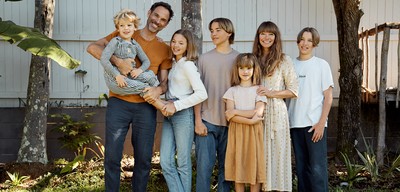
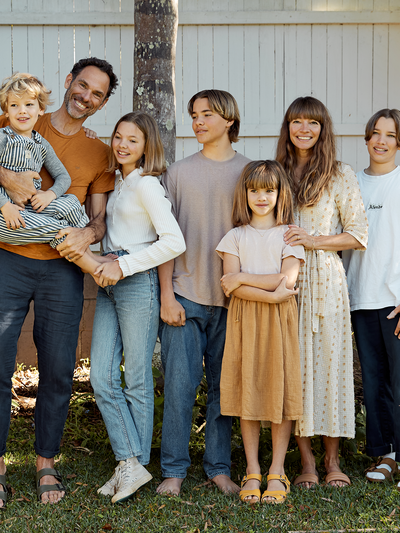
A Foolproof Guide To Navigating The Teenage Years
What stage of parenting have you found the easiest and why?
No stage is really that easy and with such a wide spread of ages in our family, there’s always some sort of challenge. At one point, I had three kids under four and it was crazy and non-stop. We were sleep-deprived and exhausted! But it was also so wonderful having such young children. While those early years can be physically demanding, the teenage years are more of an emotional rollercoaster. I remember dreading the teenage years – I worried about snarky attitudes and changing dynamics and while the dynamics have definitely changed, I actually really love having teenagers. Now, Michael and I are at a stage where we can go out to dinner or go for a surf and leave all the kids at home knowing they’re safe. In many ways it feels easier because we have older kids who can help.
What stage of parenting have you found the hardest and why?
It was hardest when we had a 14-year-old boy going through the difficult and awkward stages of early adolescence – while also having a two-year-old toddler throwing tantrums. I just felt pulled in two different directions and like I wasn’t giving enough attention to either one of them.
What has been the most unexpected challenge of motherhood?
Each child is so different, and they all require different things. It’s particularly noticeable as the kids go through adolescence – what works for one child might not work for the other. For example, one of my kids, when he is stressed or upset, gets angry and loud, while the next one just goes quiet. What they need from me is so different in those moments, and I feel like I’m constantly learning and adapting. And the minute you think you have it all figured out, you realise there’s more to learn.
What was your most joyous phase?
There was a period back in 2015 when we had four kids — our eldest was ten and the youngest was three. This was the year we travelled around the world together and it really was the most magical year. The kids were still happy to spend time as a family; our ‘baby’ was not such a baby and our eldest hadn’t yet entered adolescence. It was a special time and thankfully, we really soaked it up.
Before your children reached the teenage stage, how were you feeling about it?
I remember when I had young kids and we lived in London, mums with older children would say things like ‘it doesn’t get any easier as they get older’ or ‘just you wait until they become teenagers’ and I really did worry. Thankfully, our experience has been generally positive. Of course, there are emotional outbursts, lots of opinions and impulsive behaviour to navigate, but in general they’re more fun to be around.
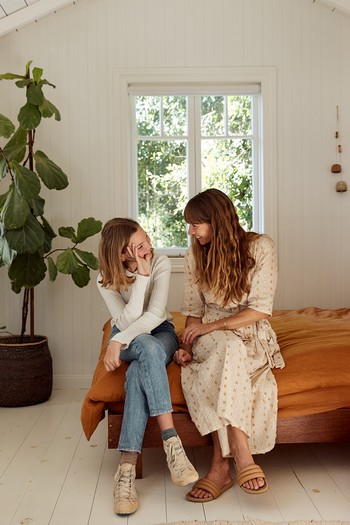
Did you do anything specific to prepare yourself?
About four years ago, I had a bit of a change-up in my career. I went from blogging about kids and parenting to creating and hosting online courses for mothers. As my children got older, my focus shifted from toddlers to teenagers, and I spent a year researching and reading about adolescence, which lead to the creation of my Tweens & Teens e-course. It’s a privilege to interview incredible experts and work with experts in child development. I’ve learned so much about teenagers and it has been hugely helpful in navigating this new phase. I’ve also been lucky to have friends who have kids of similar ages. It’s so helpful to chat about things and share our joys and challenges. It also makes me realise my kids are normal and we’re all going through the same things.
What are the changes you’ve noticed physically, mentally and emotionally?
My two boys were a bit slow to go through puberty in a physical sense, but I started noticing emotional changes at around 12. With Ivy, we noticed the changes earlier and I’m already noticing changes with Marlow, who is ten. It’s different for each child. School teachers always point out that by Year 7 (age 12/13), there is so much variation between the kids’ height and physical growth, which is a reminder that every child enters puberty at different stages. It can be a difficult time for kids because they feel the differences and like they’re really far behind or ahead of their peers, when all they want is to feel ‘normal’.
Did you spend time talking about these changes with your children?
We’re big talkers in our family and I’m such a big believer in talking openly and honestly with kids about everything. The more comfortable we are in talking to our kids, the more comfortable they become in coming to us for advice. It’s even more important to do so in this digital age, as kids are exposed to so many things online, and they need to be properly educated. One of the best ways to start a tricky conversation is to ask your child what they already know, or if they have any questions.
How did you shift your parenting style as your children entered this phase?
One of the biggest shifts has been to ask more questions and to listen more closely. As kids go through adolescence, they just want to feel seen and for their emotions to be validated; they don’t necessarily want advice or for you to fix an issue. Often, all they want is for you to sit next to them and hear what they’re saying.
Have you noticed a difference between how you parent the girls and the boys?
Not really. I have two boys who are enormously different – one is more social and extroverted, while the other is more emotionally complex, quiet and tender, and of course we have to parent them differently. I also have two girls who are different as well, so I really don’t think the differences necessarily lie in their gender – it comes down to their personalities much more.
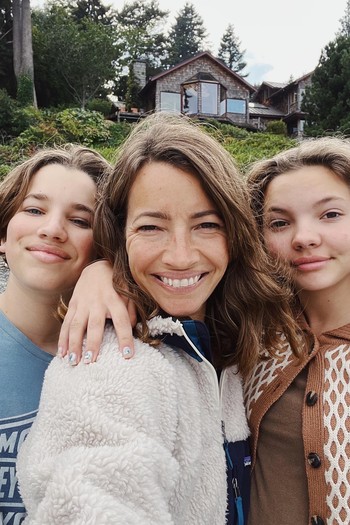
Teens often turn to their peers for advice rather than their parents – how did you adjust to this shift?
It’s so normal for teens to turn to their friends instead. As parents, we have to expect this will happen, no matter how strong our relationship with our child is. But it’s still really important to tune into them and continue to be engaged. They also need us to set boundaries. It’s a tricky balance of letting go and holding tight, so it’s one of the most difficult parts of parenting teens.
How can we understand what's going on in their lives without interfering?
Teens are very emotionally switched on. They know and understand the difference between a parent who is asking questions because they are genuinely interested and a parent who is trying to exert control. Teenagers also like to be treated with respect, so if you’re setting a boundary or saying no, they like to know why. They don’t like rules to be arbitrary. I remember when I had younger kids, I could get away with saying “Because I said so,” but there’s no getting away with that sort of response once your kids are teens.
Boundaries are often pushed in the teen years – how do you navigate boundaries?
We all have different ideas of what pushing a boundary means. In some ways, it’s not too different to raising toddlers: you wouldn’t let your toddlers be in a room with knives on their own or walk down a busy street unattended. It’s about judging the danger and letting them navigate the risk, but within reason. For example, my eldest son started asking if he could go to parties at about 16. We talked about the parties and how there may be alcohol involved; we spoke openly about the dangers and why we didn’t want him drinking. We then decided to let him go to the party, but always insisted on picking him up by 11pm, so we could get him home safely and chat with him about the party on the way home. Of course, we can’t always control what our kids do, or keep them from taking risks, but it’s important to have conversations and really explain your reasonings.
How can we support teens when things do go wrong?
One of the things I love the most about teens is that they are able to reflect on their behaviour or on something that happened in the past. When things get heated or emotionally charged, the best thing I can do is to give my child a chance to calm down. Success in this are often comes down to not taking things personally and having compassion for what they’re going through. It’s important to understand that their brains are growing and changing, that teens can be more impulsive and emotionally driven, and that our kids will make mistakes along the way. Take advantage of the moments when they are calmer to reflect on things and hopefully learn from those situations.
How can you meaningfully discipline a teenager?
It’s not easy and it really depends on what the child has done and what sort of discipline you think is necessary. We’ve had circumstances where our son wasn’t allowed to drive for a week, or we’ve not allowed them to go to social events or hang out with their friends. But in general, we try to share our disappointment and get them to understand what and why things went wrong.
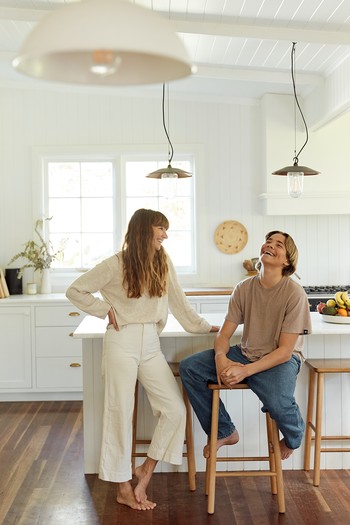
How can you maintain a strong bond with your teenager if you feel them slipping away?
From all the experts I’ve spoken to, it’s really normal for teens to move away on some level. They have to become more independent and establish their own beliefs and opinions, but this all happens over time. They don’t just turn 18 and suddenly become an independent human. The first thing is to understand how normal it is. We want our child to become a critical thinker, and often they test these things out on the people they feel most comfortable with. My best tips are to try and be there for them, listen more and talk less.
If you've hit a rough patch, what are some useful coping mechanisms?
The best coping mechanism is giving yourself time to reflect. Try chatting with a friend – I always find talking helps me to get my head around things, and often friends can share their similar experiences or advice. Often just knowing we aren’t alone in our struggles, that other mothers are going through similar challenges, is help enough.
What do you love most about having teenagers?
I love that they’re all so different and that their individual personalities come out. They can be incredibly frustrating, but there’s lots to learn from this younger generation and I’m constantly learning from my kids. I love hanging with them – playing card games, listening to music, cooking in the kitchen or going for a surf.
Finally, what are you looking forward to as your family grows up?
This year is an emotionally tender one for me — our ‘baby’ will start school and for the first time in nearly 18 years, I won’t have any kids at home during the school week. It’s also the last year our eldest will be in high school, so for one year we’ll have all five kids at the same school. To be honest, I’m trying to really soak up it up, to be present with my family and enjoy this last year with all my babies at home.
Visit CourtneyAdamo.com for more tips and advice.
DISCLAIMER: We endeavour to always credit the correct original source of every image we use. If you think a credit may be incorrect, please contact us at info@sheerluxe.com.


